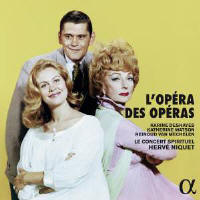Texte paru dans: / Appeared in: |
|
|
Outil de traduction (Très approximatif) |
|
|
Reviewer: Richard Lawrence In 1671 Lully assembled a Ballet des ballets, a pasticcio made up of excerpts from his own works. Here Benoît Dratwicki, artistic director of the Centre de Musique Baroque at Versailles, has done something similar for opera, but the music is not all by Lully: instead he has made a selection of pieces by a variety of composers, ranging in date from Lully (Armide, 1686) to Destouches and Dauvergne (Callirhoé, 1773). In fact the disc ends with the Passacaille from Armide, which at eight minutes at last provides some relief from a hectic succession of mainly brief numbers. The beautiful ‘Lieux funestes’ from Rameau’s Dardanus could have done the same, but Hervé Niquet takes it at such a lick as to make it sound almost restless. (Compare his 3'25" with Pichon’s 4'45" and Minkowski’s 6'12" on their respective recordings of the complete opera.) The invented story is about a prince and a princess, mutually in love, and a ‘witch queen’ who, loving the prince in vain, plots his destruction. The queen conjures up a storm which lashes the seashore. The lovers survive but the queen, stricken with remorse and thinking the prince dead, plunges into the waves. At the beginning of the action the prince has slain a monster and defeated the enemies of the kingdom. There are one or two inconsistencies in the plot – why the reference to Hercules, and of what crime is the queen guilty before she realises that she has a rival? – but no matter: Dratwicki has seized the opportunity to explore many different moods and situations. In general the musical juxtapositions work well: the Colin de Blamont excerpt, for instance, moves smoothly into a few seconds of Rameau’s Hippolyte et Aricie. But following the D minor of Dauvergne’s Les amours de Tempé with the F minor of Hercule mourant is rather a jolt. The three singers are splendid. As the princess, Katherine Watson duets euphoniously with the oboe of Héloïse Gaillard in a prayer to Cupid from Bertin de la Doué’s Le jugement de Pâris. Karine Deshayes makes a fearsome ‘reine magicienne’ and Reinoud Van Mechelen shows off the top of his register with no sense of strain in ‘Hâtons-nous’ from Dardanus. The violins and oboes of Le Concert Spirituel are breathtakingly virtuoso in the storm from Marais’s Alcyone. This is an excellent chance to enjoy a beguiling sequence of the (relatively) familiar and the (completely) unknown. |
|




